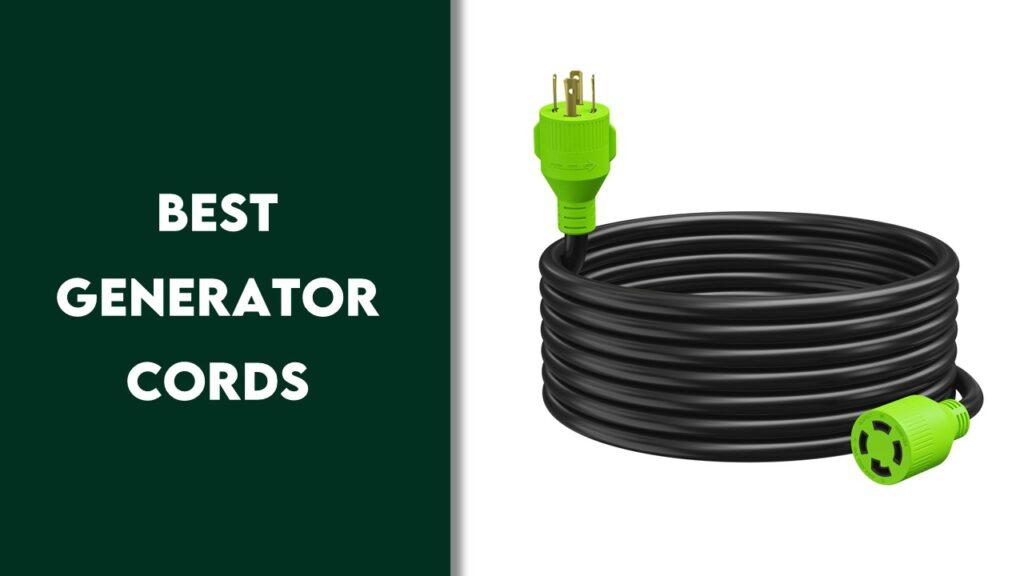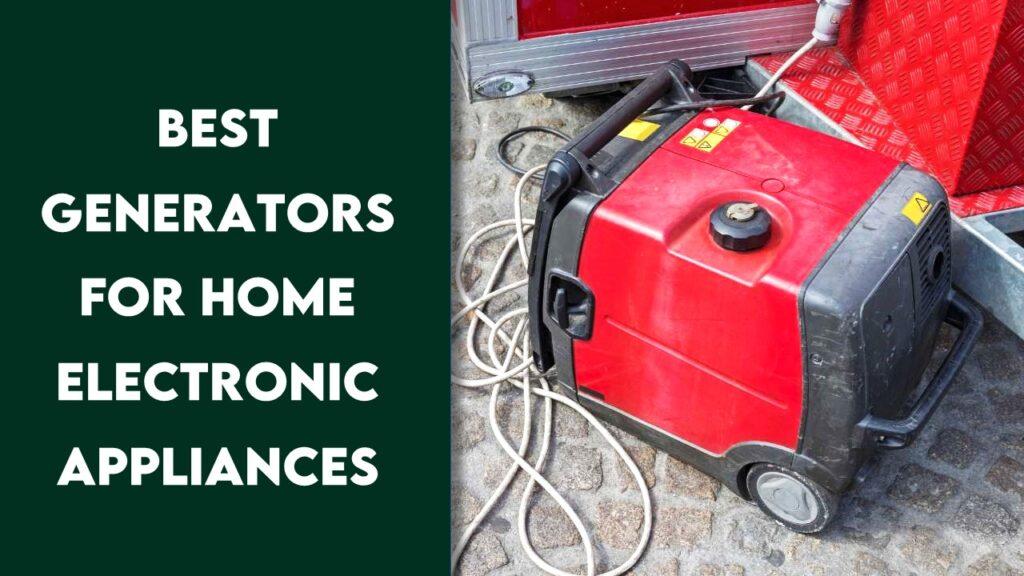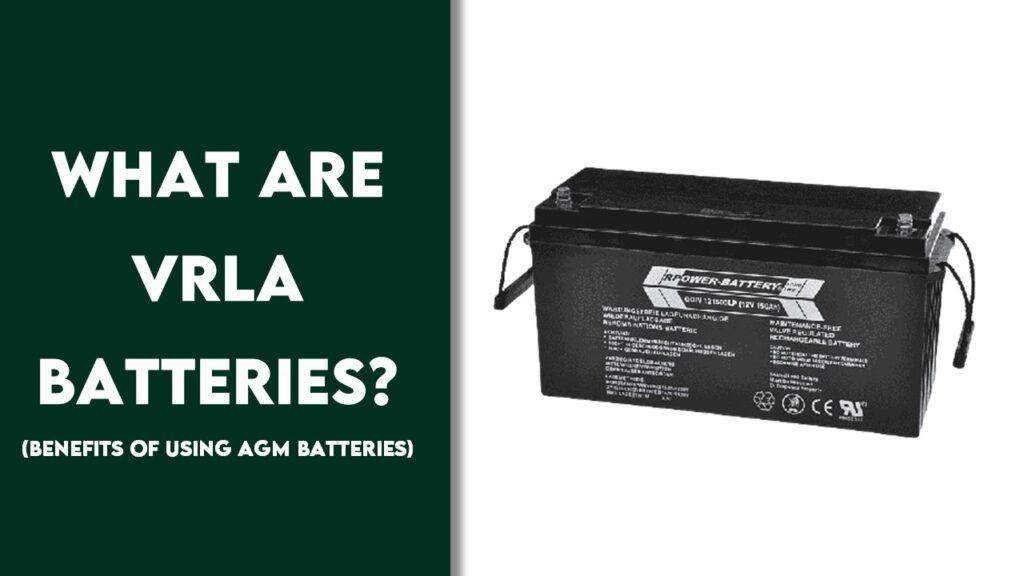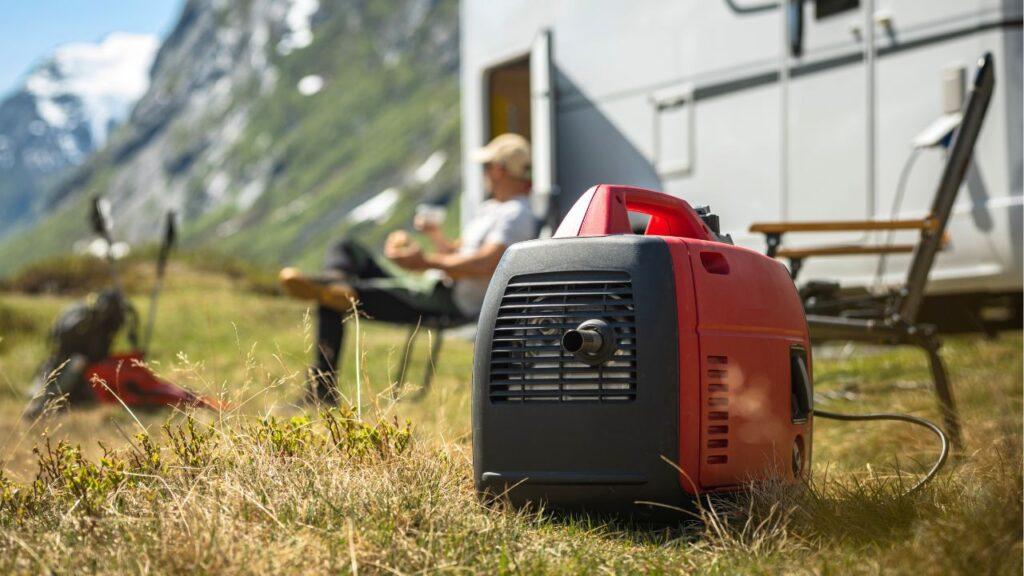Selecting the right generator for your food truck is more than a practical decision—it’s essential to your mobile business’s success. A dependable generator ensures smooth operation of all your onboard equipment, from lights to grills, and keeps you serving customers without interruption. In this guide, we have extensively researched, reviewed, and ranked the 5 best generators for food trucks in 2025 for you to pick.
We’re reader-supported. When you buy through links on our site, we may earn an affiliate commission. As an Amazon Associate, we earn from qualifying purchases.
Our Top 5 Picks Of The Best Generators for Food Trucks
1. Overall Option: Westinghouse Outdoor Power Equipment
2. Dual Fuel Option: WEN DF475T Dual Fuel
3. High Power Output: DuroMax XP13000EH Dual Fuel
4. Compact Option: Honda EU2200iTAN
5. Portable Option: Pulsar G12KBN Heavy Duty
What Is The Best Generator for Food Truck In 2025?
Choosing the perfect generator for your food truck is crucial. A reliable generator means no interruptions during a busy lunch rush and all your equipment runs smoothly. Furthermore, it’s about finding that sweet spot where efficiency meets reliability. Let’s explore some of the top options to ensure your food truck operates without a hitch.
1. Overall Option: Westinghouse Outdoor Power Equipment
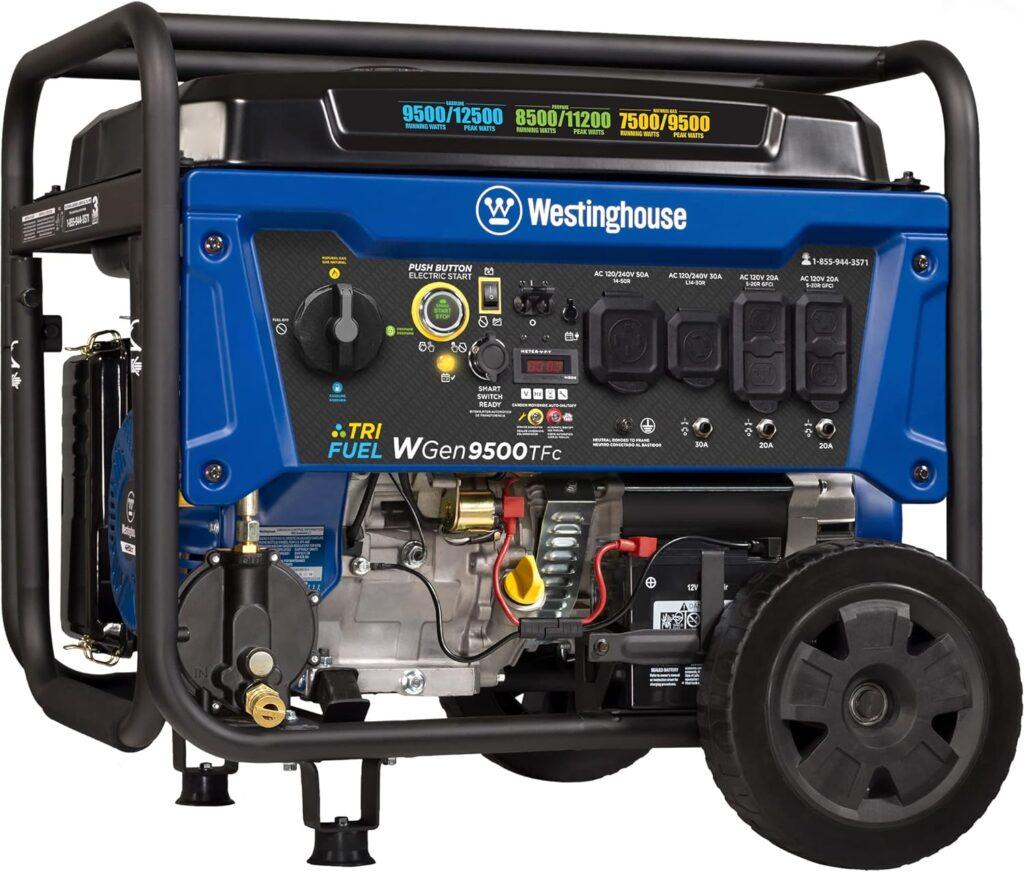
Key Specifications
- Brand: Westinghouse
- Wattage: 12500 watts
- Fuel Type: Electric (Tri-Fuel Capabilities: Gas, Propane, Natural Gas)
- Starting System: Electric Start
- Engine: 457cc 4-Stroke OHV
- Weight: 208.34 Pounds
From our experience, the Westinghouse Outdoor Power Equipment 12500 Peak Watt Tri-Fuel Home Backup Portable Generator stands out as an incredibly versatile and robust choice for food trucks. This tri-fuel generator can operate on gasoline, propane, or natural gas, making it exceptionally adaptable regardless of the circumstances. It’s equipped with features such as remote electric start and a heavy-duty 457cc engine, which ensures it runs smoothly up to 12 hours on a single fuel tank.
Moreover, this model is tailor-made for high-demand applications. It effortlessly powers major appliances and can manage multiple power needs simultaneously, thanks to its comprehensive panel that includes GFCI outlets and Transfer Switch Ready ports. The digital display and CO sensor add a layer of convenience and safety, showing vital operating stats and ensuring the unit runs within safe limits.
Pros
- Versatile tri-fuel operation adapts to various fuel sources.
- Comprehensive safety features, including CO sensor and automatic low oil shutdown.
- Strong and steady power output suitable for high energy demands.
- Portable design with heavy-duty wheels for easy mobility.
Cons
- Weighing over 200 pounds, it may require extra help to move despite the wheels.
- Some users might find the noise level higher than expected during peak operation.
In our opinion, the Westinghouse generator is an excellent choice for food truck operators who need reliable, powerful, and adaptable energy solutions. It stands as a robust performer in our list, offering extended runtime and operational safety, crucial for any food service on wheels. This generator ensures that your food truck remains operational and efficient, no matter where your culinary adventures take you from our perspective.
2. Dual Fuel Option: WEN DF475T Dual Fuel

Key Specifications
- Brand: WEN
- Wattage: 4750 watts
- Fuel Type: Electric (Dual Fuel: Gasoline or Propane)
- Starting System: Electric Start
- Engine: 224cc 4-Stroke OHV
- Weight: 105.8 Pounds
From our perspective, the WEN DF475T Dual Fuel Portable Generator presents itself as a highly flexible option for food truck operators. The ability to switch between gasoline and propane with a simple turn of the dial makes it suitable for varying availability of fuels, ensuring continuous operation. Moreover, the electric start system provides convenience, allowing for quick and hassle-free startup of the 224cc engine.
Our team appreciates the thoughtfulness behind the design of this generator. The inclusion of both 120V and 240V outputs enhances its versatility, making it perfect not only for food trucks but also as a reliable backup power source. The 4-gallon tank offers up to 11 hours of runtime at half load, which is sufficient to cover a full day’s work for most food trucks.
Pros
- Flexible fuel usage allows for adaptation to available resources.
- Electric start and versatile voltage options add convenience.
- Sufficient runtime with a 4-gallon tank.
- Compact design and included wheels enhance portability.
Cons
- Some users may find the initial setup slightly complex.
- The noise level might be noticeable in quieter environments.
In our opinion, the WEN DF475T stands out in our list as a proper choice for food truck operators looking for reliability and flexibility. Its dual fuel capability, coupled with significant runtime and easy portability, makes it a sound investment for those looking to maintain smooth operations in various locations from our perspective.
3. High Power Output: DuroMax XP13000EH Dual Fuel
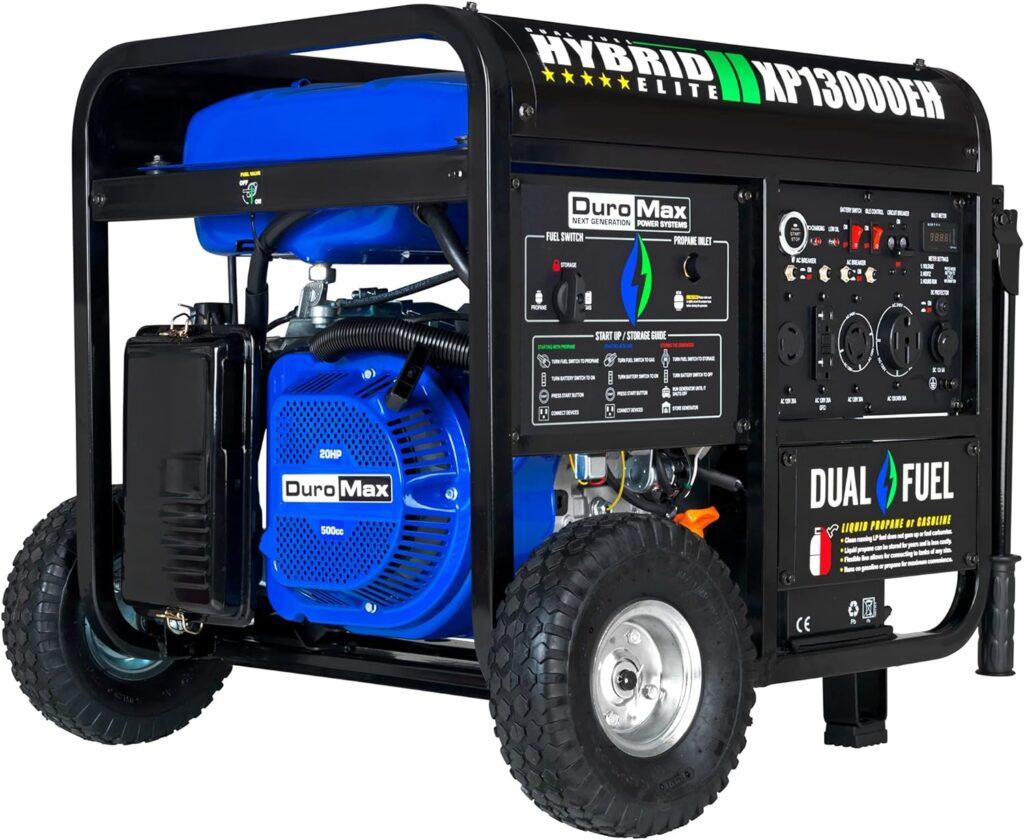
Key Specifications
- Brand: DuroMax
- Wattage: 13000 watts
- Fuel Type: Gasoline / Propane
- Starting System: Electric Start
- Engine: 500cc OHV Engine
- Weight: 234 Pounds
In our view, the DuroMax XP13000EH Dual Fuel Portable Generator is a powerhouse, ideal for food trucks needing substantial energy. This unit uniquely combines versatility with robust performance, running on either gasoline or propane, which is a significant advantage in various operating conditions. Furthermore, its electric start and sturdy design make it a reliable choice for food truck operators who demand consistent, high output.
Moreover, our experience suggests that this generator is well-suited for intensive use. The 13000 watts peak power is ample for running all essential equipment in a food truck, from refrigerators to cooking appliances. The generator’s dual fuel capability ensures that you are not left without power if one type of fuel is unavailable. The steel frame and portability features, such as no-flat tires and a foldable handle, enhance its usability in the dynamic food truck environment.
Pros
- High wattage output supports extensive appliance use.
- Dual fuel flexibility allows for operational adaptability.
- Robust steel construction withstands demanding conditions.
- Comprehensive outlet panel caters to diverse electrical needs.
Cons
- Its heavy weight might require additional setup for mobility.
- Larger size may need careful consideration for space allocation.
From our perspective, the DuroMax XP13000EH stands as an excellent choice within our list for those who prioritize reliability and power in their food truck operations. Its capacity to handle high-demand scenarios coupled with adaptable fuel options makes it a fitting ally in the bustling world of food trucks in our opinion.
4. Compact Option: Honda EU2200iTAN

Key Specifications
- Brand: Honda
- Wattage: 2200 watts
- Fuel Type: Gasoline
- Starting System: Electric Start
- Engine: Honda GXR120
- Weight: 46.5 Pounds
From our perspective, the Honda EU2200iTAN stands out as a top choice for food truck operators looking for a compact, yet powerful generator. This model is especially valued for its portability and the innovative CO-Minder technology, which enhances safety by automatically shutting down before carbon monoxide levels become dangerously high. Furthermore, its lightweight design makes it incredibly easy to transport and store, ideal for the mobile nature of food trucks.
Moreover, we appreciate its quiet operation and fuel efficiency, which are crucial in crowded and noise-sensitive environments like food festivals or residential areas. The Honda GXR120 engine is not only reliable but also provides a smooth operation that ensures your appliances run without interruptions. Despite its smaller size, the Honda EU2200iTAN delivers sufficient power to support critical food truck operations, making it a great addition to any mobile kitchen.
Pros
- Extremely portable and easy to move.
- CO-Minder technology for enhanced safety.
- Quiet operation suitable for noise-sensitive areas.
- Efficient fuel consumption keeps operational costs low.
Cons
- Limited power output may not support all high-power appliances.
- Shorter run time on a single tank compared to larger models.
In our opinion, the Honda EU2200iTAN is an excellent choice within our list for food truck operators who prioritize portability and safety. Its compact size, combined with advanced features and efficient performance, makes it a proper fit for those who need reliable power on the go without the bulk of larger generators from our perspective.
5. Portable Option: Pulsar G12KBN Heavy Duty

Key Specifications
- Brand: Pulsar
- Wattage: 12000 watts
- Fuel Type: Gasoline/Propane
- Starting System: Electric Start
- Engine: 457cc 4-Stroke OHV
- Weight: Essentially negligible at 0.01 Ounces
From our standpoint, the Pulsar G12KBN Heavy Duty Dual Fuel Portable Generator is an exemplary choice for food truck operators who need substantial power without sacrificing mobility. Its dual fuel capability allows you to utilize either gasoline or propane, providing flexibility in fuel sourcing which is especially useful during emergencies or when one fuel type is more economically feasible. Moreover, the robust 457cc engine delivers reliable performance wherever your food truck ventures.
Furthermore, we appreciate the practical design features that enhance this generator’s portability. The drop-down handles and 10” never-flat wheels make it easy to move and store, crucial for food trucks that operate in different locations. The generator’s ample array of outlets also means you can power everything from kitchen appliances to lighting without overloading the system.
Pros
- Dual fuel flexibility for operational convenience.
- High power output suits all common food truck needs.
- Portable design with easy mobility features.
- Variety of outlets supports multiple appliances.
Cons
- It’s quite heavy, which might challenge some users despite its wheels.
- The substantial power output may be more than necessary for smaller setups.
In our opinion, our evaluation positions the Pulsar G12KBN as a top-notch selection within our list for those prioritizing power and portability in one unit. Its versatility and strong performance make it a fitting companion for food truck operations, providing reliability and ease of use in various settings from our perspective.
What is a Generator for Food Trucks?
When it comes to mobile kitchens, a generator for food trucks isn’t just an add-on; it’s the heartbeat of daily operations. Essentially, these generators are portable power stations designed specifically to meet the unique needs of mobile eateries. They provide the electricity required to run everything from refrigerators and deep fryers to lights and cash registers.
Types of generators used in food trucks vary widely, reflecting the diversity of the trucks themselves. Some opt for traditional gasoline-powered units for their high output and ease of fueling. Others might choose diesel for its fuel efficiency and durability, especially those with larger setups needing more power. Then there are those who go green with propane or even solar-powered solutions, which are quieter and cleaner, reducing both noise pollution and carbon emissions—a big plus if you’re serving up meals in city centers or at quiet, upscale events.
Moreover, the right generator ensures seamless service—no one wants to wait for a cold hot dog or a lukewarm beverage. Choosing the best fit means balancing power capacity, fuel type, and portability to keep your food truck running smoothly, no matter where you’re parked.
Why Reliable Power is Critical for Food Trucks
In the bustling world of food trucks, reliable power isn’t just important—it’s crucial. Continuous power ensures that food stays fresh, orders keep flowing, and lights stay on, creating an inviting atmosphere for patrons. The importance of a continuous power supply can’t be overstated; it supports everything from safety systems like ventilation and refrigeration to customer satisfaction components like POS systems.
Furthermore, the impact of power disruptions on food truck operations can range from mildly annoying to downright disastrous. Imagine the fallout from a mid-lunch rush power outage: lost sales, spoiled food, and a tarnished reputation. That’s why investing in a dependable generator is a safeguard against these potential pitfalls. A robust power solution not only protects against unforeseen power outages but also boosts confidence in your ability to deliver uninterrupted service, no matter the external conditions.
The role of a generator in the food truck industry is as critical as the culinary skills of the chefs or the marketing savvy of the owners. It’s not just about keeping the lights on; it’s about ensuring that every aspect of the food truck experience is uncompromised, ensuring patrons leave with good food and great impressions.
Do You Need A Generator for Food Your Truck?
Deciding whether you need a generator for your food truck is pivotal. Let’s face it: your food truck is more than a vehicle; it’s a mobile kitchen and a place of business. Whether you’re parked at a bustling festival or a tranquil street corner, the need for reliable power remains constant. Here’s how to determine if a generator is essential for your operations and the types of generators you might consider.
Assessing Power Needs for Your Food Truck
Calculating your power requirements involves more than just tallying up the wattage of your appliances. Start by listing all equipment that will use power, from your refrigerators to your lights and your point-of-sale systems. Next, consider the starting and running wattage requirements of each to ensure you won’t exceed your generator’s capacity.
Furthermore, several factors influence power needs, including the size of your food truck, the type of food you serve, and even your geographical location. For example, food trucks in hotter climates might need more power for additional refrigeration or air conditioning to keep both the food and the staff cool.
Benefits of Having a Dedicated Generator
The benefits of having a dedicated generator are numerous. Enhanced mobility and location flexibility mean you can operate virtually anywhere power is otherwise unavailable. This flexibility allows access to lucrative but off-the-grid locations, expanding your business reach and potential revenue.
Moreover, a reliable generator improves food quality and service reliability. Consistent power ensures that food safety practices are maintained, with all appliances operating at optimal conditions to keep food fresh and safe. This reliability translates directly into customer satisfaction and repeat business, as customers come to know they can always expect the best from your truck.
What Are The Types of Generators Available for Food Trucks
When it comes to powering your mobile kitchen, the right choice in a generator can make all the difference. Here are some common types of generators you might consider:
- Traditional Gasoline Generators: Widely available and often cost-effective, suitable for smaller setups.
- Diesel Generators: Known for their durability and efficiency, ideal for larger trucks with higher power demands.
- Propane Generators: A cleaner alternative, offering quieter operation and less environmental impact.
- Solar Generators: Perfect for those looking to minimize operational costs and environmental footprint.
- Dual-Fuel Generators: Offer flexibility in fuel source, switching between gasoline and another fuel type like propane.
Each type has its advantages, depending on your specific power needs, budget, and operational preferences. Choosing the right generator can ensure seamless service, no matter where your food truck takes you.
A generator is not just a tool but a crucial part of your food truck’s infrastructure. Whether you opt for a gasoline, diesel, propane, solar, or dual-fuel generator, the right choice will support your business goals, maintain food safety, and enhance customer satisfaction. Remember, the goal is not just to meet the basic power requirements but to create an environment where your culinary creations can shine.
How To Buy The Best Generator for Your Food Truck
When it comes to running a food truck, your generator is the silent hero, keeping the fries crispy and the smoothies chilled. Here’s how you pick a champion that won’t let you down.
Know Your Power Needs
Use a food truck wattage calculator to get a clear picture of what you’re powering up. It’ll help you figure out what size generator for a food truck you need. Whether it’s the 12,000 watt generator for a food truck for those who mean serious culinary business or something smaller for the more quaint setups, knowing your numbers is key.
Choose Your Fuel Wisely
Gas generators for food trucks are common, but diesel generators for food trucks pack more punch with better fuel efficiency. Propane generators for food trucks are cleaner, while solar-powered generators for food trucks whisper quietly and keep the air as fresh as your ingredients. And if flexibility is your game, a dual-fuel generator, possibly a 220v generator for food truck, offers versatility in fuel choice.
Portability and Noise
Your generator shouldn’t be a lug or a disturbance. A portable generator for food truck makes moving easy, while a silent generator for food truck or the quietest generator for food truck keeps your environment serene. Look for models that boast quiet operation, as quiet food truck generators ensure you can hear your customers’ compliments rather than just engine noise.
Dependability and Safety
Opt for food truck generators known for reliability. Nothing kills the buzz of a busy lunch hour like power failure. Consider features like electric generators for food trucks with low-oil shutoffs, carbon monoxide detectors, and make sure your unit is neatly tucked away in a generator cage for food truck for added security.
Cost vs. Value
The generator for food truck cost can vary, but think long-term. Inverter generators for food trucks might cost more upfront but save money down the line with their energy efficiency and longevity. Plus, the food truck generator size and type could affect your operational budget, so consider what meets your needs without overextending your wallet.
So, whether you’re flipping burgers or tossing salads, your choice of generator powers more than just your equipment—it fuels your entire food truck venture. Make sure it’s a perfect match for your mobile kitchen, and you’ll keep serving up success without interruption.
Using Generators for Electricity Power Management in Food Trucks
Effective power management in a food truck goes beyond just having a generator; it involves setting up and maintaining your generator power system to ensure optimal performance and efficiency.
Setting Up Your Generator for Optimal Performance
Installation best practices are the foundation of effective generator use. Ensuring that your generator is properly installed can prevent issues related to efficiency and safety. It’s crucial to follow manufacturer guidelines and possibly consult with professionals. Furthermore, routine checks and maintenance are essential to keep your generator running smoothly. This includes regular oil changes, checking fuel lines, and ensuring that your generator’s firmware is up to date.
Managing Power Consumption Efficiently
Minimizing energy waste not only saves money but also extends the life of your generator. Techniques such as using energy-efficient appliances, turning off equipment when not in use, and scheduling high-energy tasks during off-peak hours can significantly reduce your energy consumption. Moreover, tools and devices to monitor power usage can provide real-time data, helping you make informed decisions about energy use and streamline your operations for greater efficiency.
Understanding how to choose and manage a generator for your food truck involves several interconnected considerations. By focusing on scalability, fuel efficiency, installation precision, and proactive power management, you can ensure that your food truck operates reliably, safely, and economically. Remember, the right generator is not just an expense; it’s an investment in the smooth operation and future growth of your mobile culinary venture.
Operational Challenges with Generators in Food Trucks
Operating a food truck comes with a unique set of challenges, especially when it comes to managing the generator. It’s not just about keeping the lights on and the grill hot; it’s about ensuring everything runs smoothly and quietly enough not to disturb your diners or the neighborhood.
Common Issues and Troubleshooting
Let’s face it: generator problems are a headache no food truck owner wants to deal with during a busy lunch rush. Common issues range from simple fixes like replacing a worn-out spark plug or refilling the oil to more frustrating problems like a malfunctioning carburetor or electrical faults. Knowing how to handle these minor troubles can often keep your service running without a hitch.
However, when you hit a snag that’s beyond a quick fix, it’s wise to call in a professional. Keeping a generator maintenance expert on speed dial can be a game changer, ensuring that small issues don’t turn into major disruptions.
Furthermore, staying on top of regular maintenance is like giving your food truck a health check—it prevents bigger problems down the road and ensures your generator remains reliable day in, day out.
Noise and Vibration Control
Noise and vibrations from a roaring generator are not exactly music to anyone’s ears, especially in the cozy confines of a food truck alley or at a quiet event. Employing strategies to minimize these disturbances, like installing sound-absorbing panels or housing your generator in a noise-dampening enclosure, can make a world of difference.
Moreover, the relentless vibrations not only annoy but can also speed up wear and tear on your equipment. Using anti-vibration mounts or isolation pads helps protect your setup and keeps the peace—your customers (and your neighbors) will thank you.
Environmental Considerations and Innovations
As the world leans more towards sustainability, the food truck industry is keeping pace, adopting more environmentally friendly practices. Today’s generators are leaps and bounds ahead of their predecessors, with options that run cleaner and quieter. From dual-fuel models that reduce emissions to fully solar-powered units that whisper rather than roar, the choices are growing.
Moreover, embracing these eco-friendly innovations doesn’t just comply with regulations—it attracts a clientele that values sustainability and supports green businesses. It’s a win-win: your food truck lessens its environmental impact while catering to a broader audience.
Navigating the complexities of food truck generators means more than just managing a machine—it’s about enhancing your mobile restaurant’s efficiency and appeal. Whether it’s maintaining your current unit or upgrading to a newer model, each step you take can lead to smoother operations and a better dining experience. After all, the goal is to leave a lasting impression on your customers, not on the environment.
Cost Considerations When Investing in a Generator for Food Trucks
Diving into the food truck business? Then you know that a generator isn’t just an accessory—it’s an essential part of your mobile restaurant. But it’s not just about picking any generator; it’s about understanding the costs involved and how it impacts your budget and operations.
Understanding the Costs Associated with Generators
First up, there’s the sticker price of the generator, which can vary dramatically depending on whether you need a compact model or something that powers you like a mini power station. Installation can also run up the bill, especially if you’re integrating it into a custom build. Then there are the running costs—fuel and maintenance—which can nibble away at your profits if not managed wisely.
Moreover, there are smart ways to keep these costs under control. Opting for a fuel-efficient generator, staying on top of routine maintenance, and using energy-saving practices not only reduce expenses but also extend the life of your generator. Managing your budget for these initial and ongoing costs ensures your generator is a boon, not a burden, to your business.
ROI on Generators for Food Trucks
Think of your generator as an investment in your food truck’s future. The right generator boosts your ability to serve up meals anywhere, which can open up lucrative opportunities at events and private gigs where power is scarce.
The return on investment comes not just from the additional sales but from the reputation you build as a reliable vendor who’s always ready to serve.
Furthermore, the longevity and reliability of a good generator mean fewer interruptions and less downtime. This kind of dependability translates to savings on emergency repairs and lost business, ultimately enhancing your food truck’s profitability in the competitive mobile dining market.
Safety Protocols for Using Generators in Food Trucks
Safety first, especially when it comes to the bustling, tight quarters of a food truck. A generator, while a powerhouse of productivity, also poses risks if not handled with care. Ensuring that you and your crew are up to speed with proper safety protocols is critical for preventing accidents and promoting a safe working environment.
It’s vital to install the generator in a well-ventilated area to avoid dangerous fumes. Regular safety checks are also essential, ensuring everything from the fuel lines to the electrical connections are in top shape and not a recipe for disaster. Moreover, educating your team on emergency procedures and daily safety checks can make all the difference in fostering a safe and efficient workspace.
The right approach to choosing and managing a generator for your food truck involves careful consideration of both costs and safety. With the right practices in place, your generator can provide more than just power—it can offer peace of mind, knowing that your mobile kitchen can handle anything the bustling street food scene throws your way. Here’s to powering up your business and keeping those delicious dishes coming!
Wrapping It Up!
In the dynamic and ever-evolving world of food trucks, selecting the right generator is more than a mere necessity—it’s the backbone of your mobile enterprise. Imagine whipping up everything from gourmet sandwiches to specialty coffees; your ability to deliver consistently exceptional service hinges on dependable power. The right generator does more than just keep the fridge cold and the lights on—it powers your ambitions, ensuring that every oven, blender, and cash register operates without a hitch.
Furthermore, the choice of a generator reaches beyond the daily grind. It influences your food truck’s environmental impact, ensures adherence to diverse local regulations, and opens up new avenues for growth. Investing in the proper generator is not just about meeting immediate needs but about future-proofing your business. It’s about ensuring that no matter where your culinary journey takes you, your food truck is equipped for success, ready to meet challenges head-on.
To sum it up, navigating the quest for the perfect generator means tuning into the unique energy demands of your menu, understanding the rhythm of your service, and adapting to wherever your kitchen on wheels calls home. Armed with the right generator, your food truck transforms from a simple eatery into a powerhouse of culinary delight, driving your business forward with every meal served.
Related FAQs
What Size Generator Do I Need For My Food Truck?
Choose a generator based on your highest power-consuming appliances to ensure all your equipment can run simultaneously.
Can I Use A Solar Generator For My Food Truck?
Yes, solar generators are a viable option for food trucks, especially for those looking to reduce their environmental impact and operating costs.
How Often Should I Maintain My Food Truck Generator?
Regular maintenance every 50-100 hours of use is recommended to ensure optimal performance and longevity.
Is It Better To Rent Or Buy A Generator For A Food Truck?
Buying may be more cost-effective in the long run, but renting can be a good option for new or seasonal businesses.
What Are The Quietest Generators For Food Trucks?
Look for inverter generators, which are typically quieter and more efficient than conventional models.
At our core, we’re a group of passionate generator, inverter, solar energy, battery enthusiasts. We dive deep into the world of tech, especially when it’s about powering your home, RV or outdoors. We try to provide as much value to the readers with our information and how to blog articles as possible. For affiliate articles our honest and transparent reviews of essential tech products are rooted in real-world experience. We take great satisfaction in offering unbiased evaluations, ensuring that you can make informed decisions when investing in your desired techs.

